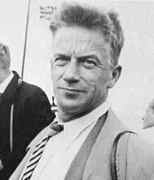Person: Sobolev, Sergei Lvovich

Sergei Sobolev was a Russian mathematician who worked on mathematical analysis and partial differential equations.
Mathematical Profile (Excerpt):
- After graduating from high school in 1925, Sobolev entered the Physics and Mathematics Faculty of Leningrad State University where his talents were quickly spotted by Smirnov who had returned to Leningrad three years earlier.
- Sobolev became interested in differential equations, a topic which would dominate his research throughout his life, and even at this stage in his career he produced new results which he published.
- By 1929 Sobolev had completed his university education and he began to teach in a number of different educational establishments.
- Vinogradov headed the Mathematics Department and invited Sobolev to join the Department.
- Working with Smirnov, Sobolev studied functionally invariant solutions of the wave equation.
- The methods also led them to a complete theory of Rayleigh surface waves and Sobolev went on to solve problems on diffraction.
- Sobolev was honoured for this outstanding work by election as Corresponding Member of the USSR Academy of Sciences in 1933.
- In the same year the Steklov Mathematical Institute was moved from Leningrad to Moscow and Sobolev went with the new Institute to Moscow.
- By 1935 Sobolev was head of the Department of the Theory of Differential Equations at the Institute.
- Sobolev's notion of generalised function (distribution) turned out to be especially important; with further developments by Schwartz and Gelfand, it became one of the central notions of mathematics.
- While working in Moscow, Sobolev built on the standard variational method for solving elliptic boundary value problems by introducing these Sobolev function spaces.
- In 1939 Sobolev was elected a full member of the USSR Academy of Sciences.
- In the October of that year Sobolev was appointed as Director of the Institute and in the spring of 1943 he supervised the move of the Institute back to Moscow.
- Sobolev became one of the first recipients of a Stalin prize (later called a State prize) in the first presentation of these prizes in 1941.
- In the early 1950s Sobolev's work turned towards computational mathematics and in 1952 he became head of the first department of computational mathematics in the Soviet Union when he organised the first such department at Moscow State University.
- After the plan was approved, Sobolev spent some time in Moscow recruiting staff and organising the establishment of an Institute in Novosibirsk.
- In ten years, under the leadership of Sobolev, the Institute of Mathematics of the Siberian Branch of the USSR Academy of Sciences has become one of the greatest centres for the mathematical sciences of international status.
- In 1958 Sobolev was part of the Soviet delegation to the International Mathematical Union, the delegation being led by Vinogradov, and Sobolev attended the International Congress at Edinburgh that year and gave an invited address on partial differential equations.
- From 1960 until 1978 Sobolev, in addition to his work at the Institute of Mathematics of the Siberian Branch of the USSR Academy of Sciences, was a professor at Novosibirsk University.
- During the 1960s much of Sobolev's research was directed towards numerical methods, in particular to interpolation.
- Sobolev applied his theories of generalised functions and of embeddings of function spaces to cubature formulae, the multi-dimensional analogues of quadrature formulae for functions of one variable.
- Again a major text by Sobolev Introduction to the theory of cubature formulae has been extremely influential in this area.
- Sobolev received many honours for his fundamental contributions to mathematics.
Born 6 October 1908, St Petersburg, Russia. Died 3 January 1989, Moscow, USSR.
View full biography at MacTutor
Tags relevant for this person:
Origin Russia
Thank you to the contributors under CC BY-SA 4.0! 

- Github:
-

- non-Github:
- @J-J-O'Connor
- @E-F-Robertson
References
Adapted from other CC BY-SA 4.0 Sources:
- O’Connor, John J; Robertson, Edmund F: MacTutor History of Mathematics Archive
